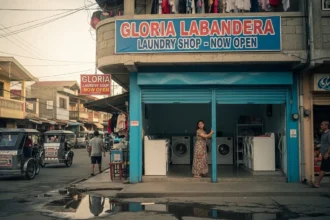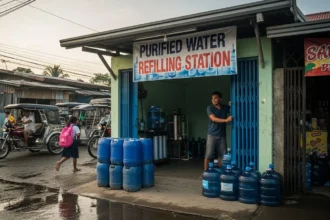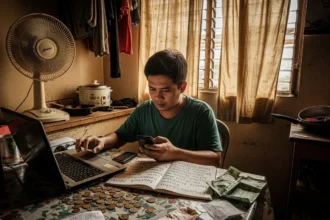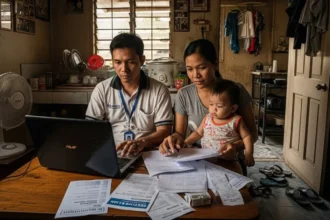Starting a business in the Philippines can be intimidating, especially when you think about capital requirements. Many people assume you need millions to get started, but the truth is, there are plenty of profitable franchises in the Philippines under ₱500,000. These negosyo opportunities offer the advantage of brand recognition, proven business models, and support systems that make them less risky than starting from scratch.
- 💡 Why Franchising Is a Smart Move in the Philippines
- 📊 Cost Breakdown of Franchising Under ₱500K
- 🛍️ Best Food Franchises Under ₱500K
- 🍟 Potato Corner
- 🥟 Siomai King
- 🥢 Master Siomai
- 🥤 Zagu (Pearl Shakes)
- 🍔 Minute Burger
- 🌯 Turks
- 🧇 Waffle Time
- 🌮 Shawarma Shack
- 🍹 Fruitas
- 🍴 Comparison Table: Best Food Franchises in the Philippines Under ₱500K
- 🛒 Retail and Services Franchises Under ₱500K
- 📈 How to Choose the Right Franchise for You
- 🙋♀️ FAQs About Franchising in the Philippines
- 🌱 Final Words for Aspiring Entrepreneurs
In this guide, I’ll share some of the best affordable franchise options, their potential earnings, and practical tips to help you choose the right negosyo that fits your budget and lifestyle.
💡 Why Franchising Is a Smart Move in the Philippines
For many Filipinos who dream of becoming entrepreneurs, franchising has become one of the most accessible entry points. Instead of starting from scratch and risking an untested idea, you’re investing in something that already works. With a franchise, you’re not just buying a product – you’re buying a system, a brand, and a support network that guides you along the way.
Key Benefits of Franchising
- Proven Business Model – The trial-and-error stage has already been done by the franchisor. You step into a business that’s tested, refined, and ready to run.
- Brand Recognition – In the Philippines, consumers love trusted names. Whether it’s a milk tea brand, a siomai stall, or a mini-grocery, customers are more likely to buy from a name they already know.
- Training & Support – Most franchises include training for you and your staff, marketing guidance, and even supplier connections. For first-time entrepreneurs, this reduces the stress of figuring everything out alone.
- Flexibility – Franchises come in all shapes and sizes. From food carts worth ₱50,000 to full-service restaurants or convenience stores in the millions, you can choose based on your capital, location, and personal interests.
The Pinoy Fit
In the Philippine setting, where tiyaga at sipag (hard work and perseverance) are deeply valued, franchising can be the perfect stepping stone. Many OFWs returning home invest their savings in franchises to create steady income for their families. Some moms put up small kiosks near schools, while others build bigger ventures in malls or transport hubs.
Unlike starting from zero, franchising gives you a playbook – but it still requires effort. It’s not “automatic success,” but it does give a head start compared to building a brand from the ground up.
At the heart of it, franchising appeals to the Pinoy because it reflects our values: hard work, trust in community brands, and the desire to secure a better future for our families.

📊 Cost Breakdown of Franchising Under ₱500K
When people see “₱500,000 franchise,” the first question is always: “Saan napupunta ang pera?” Understanding the breakdown helps you set realistic expectations and avoid surprises. Here’s how a typical franchise under 500k in the Philippines is divided:
🏷️ Franchise Fee
This is your “entry ticket” to use the brand’s name, logo, and system. For small kiosks or carts, fees usually range from ₱50,000–₱150,000.
🛠️ Equipment & Store Setup
Expect ₱100,000–₱200,000 for cart construction, signage, cooking tools, freezers, or water dispensers – depending on the type of franchise.
📦 Initial Inventory
Franchisors usually require you to purchase starting stocks worth ₱30,000–₱70,000 (ingredients, products, packaging).
👩🍳 Training & Support
Part of your package covers staff training, uniforms, and basic marketing collaterals. This is often bundled, but you should still set aside ₱10,000–₱20,000.
💡 Permits & Miscellaneous
Even small franchises need permits (barangay, mayor’s, BIR). Allocate at least ₱10,000–₱20,000 for paperwork and other admin costs.
Sample ₱500K Franchise Budget (Food Cart Example)
| Expense Category | Estimated Cost (₱) |
|---|---|
| Franchise Fee | 100,000 |
| Cart / Kiosk Setup | 150,000 |
| Initial Inventory | 50,000 |
| Equipment & Supplies | 120,000 |
| Training & Marketing | 20,000 |
| Permits & Miscellaneous | 15,000 |
| Total | 455,000 |
👉 Notice how the ₱500K budget can be quickly consumed – which is why careful planning is essential. Always keep a buffer of at least ₱30,000–₱50,000 for unexpected expenses like rent deposits, staff allowances, or repairs.
🛍️ Best Food Franchises Under ₱500K
Food is one of the most resilient industries in the Philippines-kahit anong mangyari, kakain at kakain ang tao. For entrepreneurs, this makes food franchises an attractive option. Here are some top picks:

🍟 Potato Corner
Potato Corner is one of the most recognizable names in the Philippine food cart industry. Known as the “King of Flavored Fries,” it has been operating since 1992 and has become a go-to franchise for first-time entrepreneurs. Its kiosks are present in malls, schools, terminals, and even small town centers – making it a top pick for a franchise under 500k in the Philippines.
💸 Franchise Fee & Startup Cost
- Franchise Fee: around ₱100,000–₱150,000
- Total Investment: ~₱300,000–₱400,000 (includes cart, fryer, freezer, signage, and starting inventory)
- View the Packages Here
📈 Monthly Revenue Potential
Depending on location, a Potato Corner cart can earn:
- ₱40,000–₱90,000 in monthly sales
- Net profit margins average 20–25%, meaning ₱8,000–₱22,500 take-home monthly.
⏳ ROI / Payback Period
On average, franchisees report ROI in 12–18 months, especially in high-foot-traffic areas like malls and transport hubs.
✅ Pros & Cons
Pros:
- Strong brand recognition and loyal customer base
- Affordable entry compared to bigger fast-food franchises
- Simple operations with minimal staff
Cons:
- Highly competitive (many Potato Corner kiosks already exist)
- Sales heavily dependent on foot traffic
- Menu limited to fries and flavored variations
👌 Best For
Entrepreneurs in urban centers, students looking for part-time businesses, or families near schools and malls. Perfect for those who want a low-cost franchise with proven demand.
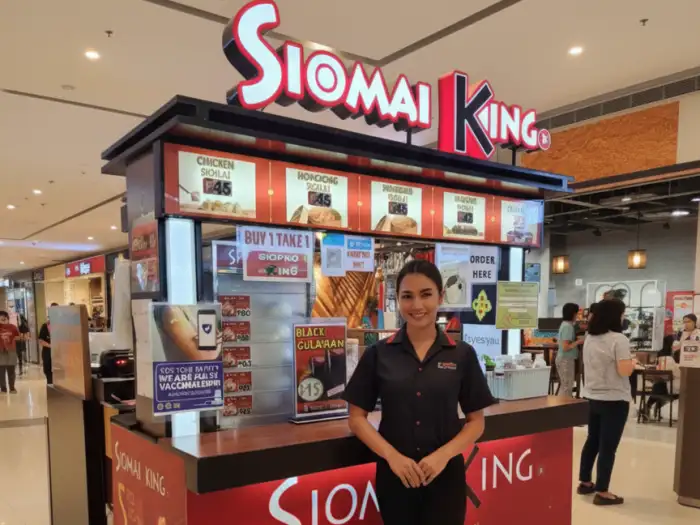
🥟 Siomai King
Siomai is a staple in the Filipino street food scene, and Siomai King has carved out a reputation as one of the most popular affordable food cart franchises in the Philippines under 500k. Backed by JC Worldwide Franchise Inc., Siomai King is known for its “5 pieces siomai for ₱35” value meals and wide flavor choices. Its affordable pricing and everyday appeal make it attractive for first-time entrepreneurs.
💸 Franchise Fee & Startup Cost
- Franchise Fee: included in the package
- Total Investment: ~₱328,888 (includes cart setup, steamer, freezer, uniforms, and starting stock)
- View the Siomai King Package Here
📈 Monthly Revenue Potential
A Siomai King cart typically earns:
- ₱30,000–₱70,000 monthly gross sales
- With margins of 20–25%, expect around ₱6,000–₱17,500 in net profit monthly, depending on location.
⏳ ROI / Payback Period
ROI is achievable within 12–16 months in areas with high foot traffic like jeepney terminals, markets, or near schools.
✅ Pros & Cons
Pros:
- Affordable all-in package below ₱300K
- Popular Filipino food with strong everyday demand
- Simple operations – one to two staff is enough
Cons:
- Competition with other siomai franchises (Master Siomai, Siomai House, etc.)
- Sales can be affected if placed in low-foot-traffic areas
- Limited upselling opportunities beyond siomai and drinks
👌 Best For
Budget-conscious entrepreneurs looking for a low-cost food franchise under 500k that appeals to the masses. Best in areas with heavy pedestrian traffic like barangay centers, terminals, and campuses.
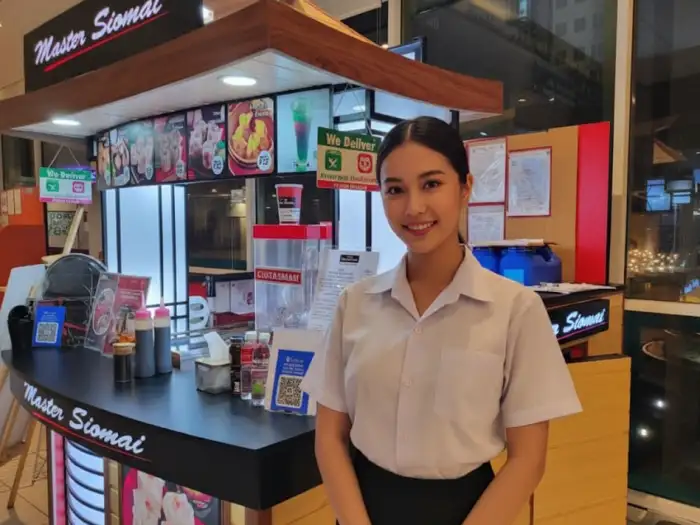
🥢 Master Siomai
Master Siomai is one of the biggest names in the siomai cart industry, operated by Masterrific Foods. With its bright orange kiosks and consistent presence in malls and terminals, it’s become a household name. Unlike smaller players, Master Siomai focuses on quality and branding, which is why many see it as a top food franchise in the Philippines under 500k.
💸 Franchise Fee & Startup Cost
- Franchise Fee: ₱280,000 package (all-in, cart type)
- Total Investment: ~₱280,000–₱350,000 depending on cart size and location requirements
Includes:
- Stainless steel cart, freezer, steamer, uniforms
- Initial stocks and supplies
- Franchise training and marketing support
📈 Monthly Revenue Potential
- Average ₱50,000–₱120,000 gross monthly sales
- With margins of 20–25%, expect ₱10,000–₱30,000 net monthly income
⏳ ROI / Payback Period
Franchisees report ROI within 12–18 months, depending on foot traffic and rent costs.
✅ Pros & Cons
Pros:
- Strong brand recall and trusted name nationwide
- High-quality siomai and product consistency
- Good franchisor support and marketing campaigns
Cons:
- Higher franchise fee compared to smaller siomai brands
- Very competitive market (many existing carts)
- Limited menu beyond siomai and drinks
👌 Best For
Entrepreneurs who want to ride on the reputation of a strong, established siomai brand. Best placed in malls, food courts, or busy transport hubs where demand for quick snacks is constant.

🥤 Zagu (Pearl Shakes)
When it comes to pearl shakes, Zagu is the OG. Founded in 1999, this brand practically introduced pearl shakes to the mainstream Pinoy market. Its purple branding is instantly recognizable, and despite newer milk tea and shake competitors, Zagu remains a trusted food cart franchise under 500k in the Philippines.
💸 Franchise Fee & Startup Cost
- Franchise Fee: ₱250,000–₱270,000 (cart package)
- Total Investment: ~₱300,000–₱350,000
Package includes:
- Cart setup with blender, freezer, and utensils
- Starter inventory and packaging
- Staff training and franchise support
📈 Monthly Revenue Potential
- Average ₱40,000–₱100,000 monthly sales
- Net profit margins around 15–20%, translating to ₱6,000–₱20,000 monthly net income
⏳ ROI / Payback Period
ROI is possible within 12–18 months, though locations near schools, malls, and transport hubs usually see faster payback.
✅ Pros & Cons
Pros:
- Strong brand recognition with loyal following
- Simple operations and easy-to-learn menu
- Relatively affordable entry-level franchise
Cons:
- Stiff competition from newer milk tea and shake brands
- Seasonal demand (sales drop during colder months)
- Margins slightly lower than siomai or fries carts
👌 Best For
Entrepreneurs targeting school areas, malls, and youth-heavy locations. Zagu remains a reliable entry point for those who want a beverage business with franchise capital under 500k.

🍔 Minute Burger
If you’re looking for an affordable burger business, Minute Burger is one of the strongest contenders. Operating since 1982, it’s a familiar brand for Filipinos craving budget-friendly burgers, sandwiches, and drinks. With over 600 outlets nationwide, it has proven that it’s possible to run a burger franchise in the Philippines under 500k and still compete against bigger fast-food chains.
💸 Franchise Fee & Startup Cost
- Franchise Package: starts at around ₱290,000–₱400,000 depending on the kiosk size and inclusions
- Package covers:
- Cart or kiosk setup
- Griddles, freezers, and other cooking equipment
- Initial food stocks and packaging
- Staff training and operations manual
📈 Monthly Revenue Potential
- Average ₱60,000–₱120,000 monthly gross sales
- Net profit margins range 15–20%, giving franchisees ₱9,000–₱24,000 net income per month
⏳ ROI / Payback Period
ROI can be reached in 18–24 months, especially in busy areas near schools, terminals, or residential communities.
✅ Pros & Cons
Pros:
- Decades of brand recognition and stable customer demand
- Strong franchisor support and supply chain network
- Menu flexibility (burgers, sandwiches, drinks)
Cons:
- Competition with both local burger stalls and international fast-food chains
- Margins slightly thinner compared to siomai or fries kiosks
- Higher equipment requirements mean more maintenance costs
👌 Best For
Entrepreneurs who want to invest in a well-established, affordable burger franchise. Ideal for locations with consistent foot traffic and communities looking for quick, budget meals.
🌯 Turks
From humble food carts in 2007 to becoming a household name, Turks has redefined shawarma in the Philippines. Known for its soft pita wraps, tender beef or chicken, and signature garlic sauce, it’s become a favorite quick-meal option in malls, terminals, and even small provincial towns. Today, Turks is one of the strongest shawarma franchises under 500k in the Philippines, with hundreds of branches nationwide.
💸 Franchise Fee & Startup Cost
- Franchise Fee: included in package
- Total Investment: starts at ₱300,000–₱450,000 (for cart/kiosk type)
- Inclusions:
- Cart or kiosk construction
- Shawarma grills, freezers, and utensils
- Initial food stocks and packaging
- Staff training, uniforms, and franchise support
📈 Monthly Revenue Potential
- Average ₱70,000–₱150,000 gross monthly sales
- Net margins around 20–25%, or ₱14,000–₱37,500 net profit monthly
⏳ ROI / Payback Period
Franchisees usually reach ROI in 12–18 months, with faster recovery in mall-based or high-foot-traffic areas.
✅ Pros & Cons
Pros:
- Strong brand presence and marketing campaigns
- High-demand product with wide appeal
- Menu variations beyond shawarma (rice meals, wraps)
Cons:
- Heavier competition with other shawarma stalls and local players
- Slightly higher operating costs for meat, sauces, and utilities
- Needs prime locations for maximum sales
👌 Best For
Entrepreneurs who want to ride on the popularity of shawarma while working with a well-established, affordable franchise brand. Best suited for malls, transport terminals, and urban centers with high snack demand.
🧇 Waffle Time
Dubbed the “Pambansang Waffle ng Pilipinas,” Waffle Time has been around since 1998 and is one of the pioneers of waffle-on-a-stick snacks. Its colorful kiosks are present in malls, terminals, and even provincial centers, making it a well-loved franchise under 500k in the Philippines. Waffle Time is popular for its affordable and filling snacks, which appeal to students and commuters looking for a quick bite.
💸 Franchise Fee & Startup Cost
- Franchise Fee: ₱250,000–₱300,000 (cart package)
- Total Investment: ~₱350,000–₱400,000
Package includes:
- Customized cart with signage
- Cooking equipment and utensils
- Starter stock and packaging
- Training, uniforms, and marketing materials
📈 Monthly Revenue Potential
- Average ₱40,000–₱80,000 monthly gross sales
- Net profit margins 20–25%, or around ₱8,000–₱20,000 net monthly income
⏳ ROI / Payback Period
Franchisees usually achieve ROI in 12–18 months, with prime spots (malls, terminals, schools) reaching payback faster.
✅ Pros & Cons
Pros:
- Strong nationwide brand recognition
- Affordable price point (great for students and commuters)
- Simple menu and easy operations
Cons:
- Limited product variety (waffles only)
- Sales can dip if placed in areas without high foot traffic
- Competition with other quick snack stalls (corn dogs, siomai, fries)
👌 Best For
Entrepreneurs looking for a snack food franchise with affordable startup capital. Perfect for busy foot-traffic areas like malls, transport hubs, and campuses.
🌮 Shawarma Shack
Shawarma Shack has made a name for itself with its catchy “Buy One, Take One” promo that resonates strongly with Filipino consumers. Founded in 2015, the brand quickly expanded nationwide, giving shawarma lovers an affordable yet satisfying option. With its aggressive marketing and growing footprint, it has become one of the fast-rising food franchises in the Philippines under 500k.
💸 Franchise Fee & Startup Cost
- Franchise Fee: included in the package
- Total Investment: starts at ₱350,000–₱450,000 (for cart or small kiosk)
- Inclusions:
- Cart/kiosk construction with branding
- Shawarma grillers, freezer, and utensils
- Initial stocks (meat, sauces, packaging)
- Training for staff and operations support
📈 Monthly Revenue Potential
- Typical gross sales range from ₱80,000–₱150,000 monthly
- With net margins around 20–25%, that’s ₱16,000–₱37,500 net profit monthly
⏳ ROI / Payback Period
Franchisees often report ROI in 12–18 months, especially when located in high-foot-traffic areas like malls, terminals, and busy town centers.
✅ Pros & Cons
Pros:
- Strong brand recall thanks to “Buy One, Take One” promo
- Affordable entry compared to big fast-food brands
- Steady consumer demand for shawarma and quick snacks
Cons:
- Competition with Turks and smaller shawarma stalls
- Profit margins may be slimmer due to promos and rising meat costs
- Requires consistent high traffic to sustain sales volume
👌 Best For
Entrepreneurs who want a modern, fast-growing shawarma franchise that thrives on volume sales and catchy promos. Perfect for mall kiosks, transport hubs, and community centers where snack demand is strong.
🍹 Fruitas
Fruitas is the leading fresh fruit shake franchise in the country, with over 20 years of experience and hundreds of kiosks nationwide. Known for its refreshing fruit-based drinks, it has built strong appeal among health-conscious Filipinos and everyday commuters looking for a quick, affordable thirst-quencher. With its recognizable green branding and wide range of fruit flavors, Fruitas remains a reliable beverage franchise under 500k in the Philippines.
💸 Franchise Fee & Startup Cost
- Franchise Fee: included in the package
- Total Investment: ~₱300,000–₱400,000 (kiosk package)
Package includes:
- Kiosk/cart construction with signage
- Blenders, freezer, and utensils
- Starter stock (fresh fruits, cups, straws, syrups)
- Training, uniforms, and franchise support
📈 Monthly Revenue Potential
- Average ₱60,000–₱120,000 gross monthly sales
- Net margins around 15–20%, translating to ₱9,000–₱24,000 net monthly income
⏳ ROI / Payback Period
Franchisees typically reach ROI in 12–18 months, especially in malls, schools, and transport hubs where demand for drinks is high.
✅ Pros & Cons
Pros:
- Established nationwide brand with loyal customers
- Healthy, fruit-based products – appeals to a growing health-conscious market
- Menu variety (fruit shakes, juices, snacks)
Cons:
- Seasonal demand (sales dip during rainy/cool months)
- Higher inventory wastage risk due to fresh fruit spoilage
- Requires reliable daily supply of fruits to keep quality consistent
👌 Best For
Entrepreneurs who want to enter the beverage and healthy lifestyle market with an established, trusted brand. Best in malls, commercial hubs, and provincial town centers with consistent foot traffic.
🍴 Comparison Table: Best Food Franchises in the Philippines Under ₱500K
| Franchise | Startup Cost (₱) | Monthly Sales Potential (₱) | Net Profit Margin | ROI Timeline | Best Location Fit |
|---|---|---|---|---|---|
| Potato Corner | 300K–400K | 40K–90K | 20–25% | 12–18 months | Malls, schools, terminals |
| Siomai King | ~288,888 | 30K–70K | 20–25% | 12–16 months | Terminals, barangays, schools |
| Master Siomai | 280K–350K | 50K–120K | 20–25% | 12–18 months | Malls, food courts, busy hubs |
| Zagu (Pearl Shakes) | 300K–350K | 40K–100K | 15–20% | 12–18 months | Schools, malls, transport hubs |
| Minute Burger | 290K–400K | 60K–120K | 15–20% | 18–24 months | Communities, schools, terminals |
| Turks | 300K–450K | 70K–150K | 20–25% | 12–18 months | Malls, transport hubs, town centers |
| Waffle Time | 350K–400K | 40K–80K | 20–25% | 12–18 months | Malls, schools, transport hubs |
| Shawarma Shack | 350K–450K | 80K–150K | 20–25% | 12–18 months | Malls, terminals, busy centers |
| Fruitas | 300K–400K | 60K–120K | 15–20% | 12–18 months | Malls, schools, commercial hubs |
Food carts and kiosks are especially popular dahil maliit lang ang space needed, and they can be set up in malls, terminals, or even near schools.
🛒 Retail and Services Franchises Under ₱500K
If food isn’t your thing, don’t worry-retail and services also offer profitable opportunities.
| Franchise Brand | Initial Investment | Industry | Why It’s a Good Pick |
|---|---|---|---|
| Generika Drugstore Express | ₱400K–₱500K | Pharma | Strong demand for affordable medicines |
| Laundry Shop Express | ₱300K–₱500K | Laundry | High demand in urban areas |
| Petron Bulilit Gas Station | ₱400K–₱500K | Fuel | Trusted brand, steady income |
| Aquabest | ₱250K–₱350K | Water Refilling | Everyday necessity, stable market |
| The Generics Pharmacy Kiosk | ₱300K–₱450K | Pharma | Affordable medicines, wide appeal |
These franchises are excellent for entrepreneurs looking for steady demand businesses-essentials like medicine, water, and laundry are “hindi naluluma” industries.
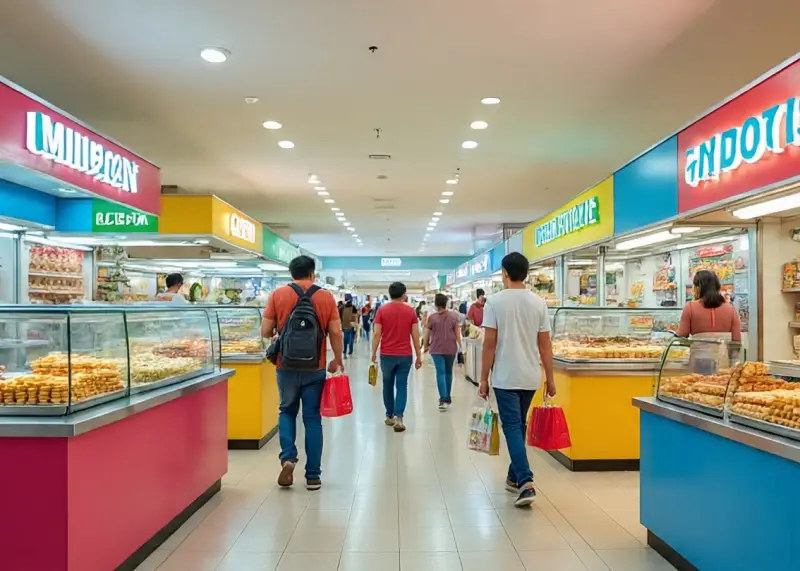
📈 How to Choose the Right Franchise for You
With thousands of franchise opportunities in the Philippines – from siomai stalls to convenience stores – the challenge isn’t finding one, but choosing wisely. Not all franchises guarantee success, and the wrong decision can quickly drain both savings and energy. Here are some guidelines to help you find the right fit:
Assess Your Budget
Don’t be blinded by the franchise fee alone. Look at the bigger picture: rent, renovation, staff salaries, utilities, and supplies. For example, a ₱300,000 food cart franchise may sound affordable, but if it’s placed inside a high-rent mall, expenses can easily double. Always compute for total monthly costs before committing.
Check Location Fit
In the Philippines, location is king. Even the most popular brand will struggle if it’s hidden away or placed in an area without enough foot traffic. Study your target spot – is it near schools, offices, or transport terminals? A milk tea stall may thrive near a university, while a laundry franchise could do well in residential barangays.
Know Your Interests
Running a franchise is not a “hands-off” business. If you hate cooking, maybe food carts aren’t for you. If you’re passionate about fitness, a wellness or gym-related franchise might excite you more. Passion matters because you’ll be involved in operations every day – checking inventory, talking to customers, motivating staff.
Research ROI
Ask direct questions about the average payback period. Many small food cart franchises under ₱500K claim a return of investment in 1–2 years. Bigger brands like convenience stores or food chains may take 3–5 years. Remember, a franchise is an investment, not a quick cash machine – patience is key.
Read the Fine Print
Before signing, review the contract carefully. Check royalty fees, renewal terms, territory exclusivity, and the level of support you’ll get. Some franchises offer full marketing campaigns, while others leave most of the selling to you. Clarify these details early to avoid surprises.
Final Thought
The best franchise isn’t always the biggest or most famous name. It’s the one that matches your lifestyle, capital, and community market. Choosing wisely means balancing passion with practicality, and brand with sustainability. In the long run, it’s not just about following a system – it’s about building a business you can see yourself nurturing every day.
🙋♀️ FAQs About Franchising in the Philippines
1. Is ₱500K enough to start a franchise in the Philippines?
Yes. Many food carts, kiosks, and small service-based businesses fall within this budget. Brands like siomai stalls, pearl shakes, and water refilling stations often start in the ₱100K–₱500K range.
2. How long does it take to get ROI from a franchise?
Most small franchises promise returns within 12–24 months, but actual ROI depends on location, demand, and how actively you manage operations. Larger franchises like restaurants may take 3–5 years.
3. Are food franchises better than service franchises?
Food tends to have faster turnover and impulse buyers, but services like laundry shops, pharmacies, or water refilling stations offer more stability and steady demand long-term.
4. Do I need business experience to run a franchise?
Not necessarily. Most franchisors provide training, manuals, and marketing support. However, having basic financial discipline and people-management skills makes a huge difference.
5. Can I get a loan to start a franchise?
Yes. Several banks in the Philippines, including BPI and BDO, offer franchise financing loans. Some franchisors also partner with financing institutions to help franchisees get started.
6. What’s the most important factor in franchise success?
Location is king. A strong brand can still fail in a poor spot, while a simple food cart can thrive near schools or transport terminals. Consistency in operations and good customer service also matter.
7. Can OFWs invest in franchises while abroad?
Yes. Many OFWs invest in food carts or service-based franchises and have trusted family members run them. Some franchisors even tailor packages specifically for OFW investors.
8. Are online or digital franchises available?
Yes. Beyond food and retail, some franchises now include digital services like e-loading businesses, remittance centers, or courier partnerships. These require lower capital but rely heavily on volume.
9. Do franchises guarantee success?
No. While they lower risks by giving you a proven system, success still depends on your effort, location, and market conditions. A franchise is not a magic formula – it still requires hard work and management.
10. What are the red flags when choosing a franchise?
Be cautious of franchisors who:
- Promise unrealistic ROI (like “bawi in 3 months”).
- Have no existing successful branches.
- Provide vague contracts with hidden fees.
Always research the company, talk to existing franchisees, and read the fine print before investing.
🌱 Final Words for Aspiring Entrepreneurs
If you’ve been dreaming of starting a negosyo but think capital is a barrier, let this be your sign: it’s possible with ₱500K or less. The best franchises in the Philippines under ₱500K offer practical, proven paths to success.
Of course, no business is “easy money.” Kahit may sistema na, you still need dedication, hands-on management, and customer care. But if you’re willing to put in the work, franchising can be your first big step toward financial freedom.
So if you’re ready, start researching, compare your options, and take the leap. Remember, in business, the hardest part is always the first step.




